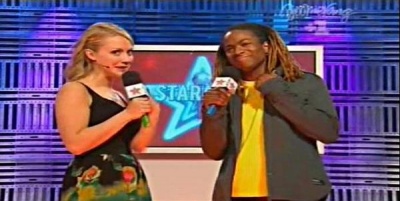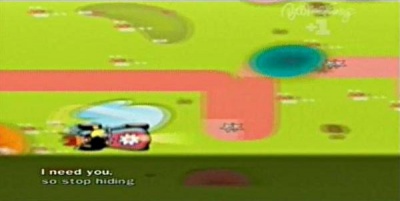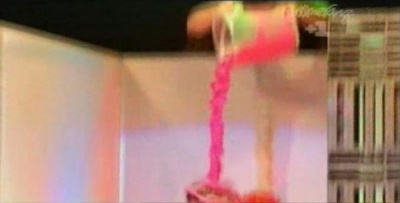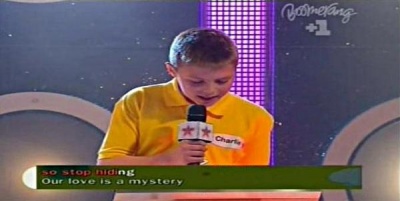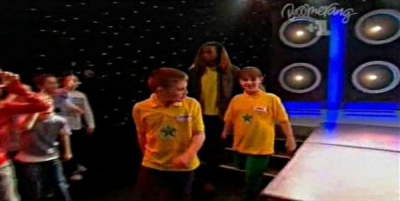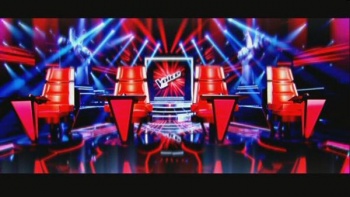Weaver's Week 2013-02-17
Last week | Weaver's Week Index | Next week
It's February, so two things are happening. The schedulers have paused in the flow of new shows, to see which make a splash and which will be self-replicating connect spelling. And we've been off with our way-cool friends, bolting to pubs and clubs across the country in search of a half-way decent night out and some floor wax.
We had The Common Denominator scheduled for review this week, but Channel 4 preferred to get Face the Clock out of the way first and hasn't aired a single episode. Expect that review in a month or so. E4 promised My Little Princess in late January, but that's also gone to the great scheduling hole in the sky, not to emerge until the end of this month.
So, we can either tell tales of bands who can put on a show, or we can dig out a programme that we've avoided reviewing since autumn 2009. Only one of these is, in any way, on-topic.
Contents |
Staraoke
Archie Productions / Intervisio for Boomerang, October 2009
The voice-over asks us to welcome Mr. and Mrs. Showbiz, Nigel and Laura. Straight away, our two hosts launch into song: "Walking on sunshine" is a good fit for Laura Showbiz's voice, Nigel Showbiz finds it a bit of a strain. A poor choice, not least because this song (released 1985) is older than the audience (released circa 1997) but then it's only the opener.
Before meeting the teams, we're told that the winners will take home a delicious prize of a new games console, while the losers will be gunged by the G-man, a masked character who stands above an alcove, clutching a bucket of coloured slop. Already, we know that this isn't going to be a show about winning, but about not losing. Already, we know that the show revolves around gunge, and not being on the end of it. We have a theory that children's shows only reach for the gunge when they've run out of better ideas, or can't afford a proper prize. Here, the show can afford a prize, so they've already run out of ideas. It's going to be a very long twenty two minutes.
Let's meet the teams. By a curious coincidence, both teams are made up of a brother and sister from Hornchurch in Essex. His favourite band is Take That, and her favourite singer is Miley Cyrus. Ooh, don't mention the Miley, at the time she was a Disney Channel property, and some viewers will already be flicking over to see if Hannah Montana is on. There's no such merciful release for us, we're here to the bitter end. Laura Showbiz talks to the Terrific Twosome, Nigel Showbiz to the Dynamic Duo.
The basic idea of Staraoke is to perform a popular music track, hitting the right notes at the right time. The desired note is displayed by a graphic of road, along which a small car travels at a constant speed. When the melody rises, the path goes up the screen; when the melody falls, so does the path. Stars are dotted along the road, and when the car runs over them, it picks them up and increases the score. The contender can see the car, and the path ahead, and can modulate their singing to reach the desired note.
Well, they would if they could do that and see the words. The song's lyric is shown on a separate panel beneath the main display, two lines at a time, and the rhythm is tapped out by turning the words a different colour. It's not synchronised with the tune at all, and the player can either get the note right, or the words right. The points are for hitting the notes, the pressure is to make the lyric.
This isn't a problem for songs where the tune is simple, or the words are well-known. Both of these conditions apply for the opening number, where the brothers perform "Life is a rollercoaster", as made popular by Ronan Keating. It's a technically unchallenging song – for that original star, it has to be – though we're not convinced that it bears being heard twice in quick succession.
The sisters? They're going to get "Grace Kelly", as made popular by Mika. They're going to need every last note of their vocal range to spiral up to the peak in the chorus. Though Nigel Showbiz and Laura Showbiz encourage their teams as best they can, and the audience will cheer for anything, nothing is going to conceal the problems of song choice: one of these tunes is much more demanding than the other. The commercial break comes as something of a merciful relief.
Points have been awarded as though Staraoke was participating in Alistair Darling's stimulus package: 1000 points are available for each performance, evenly distributed across the stars. For round three, the teams are invited to stake some of their points on whether the Mystery Guest will or won't score 75% on a particular song; if the performer fails, they'll get gunged. The teams don't know who the Mystery Guest is, they've no clue if it's Enrico Caruso or 'Enry Cantsing. It's just a blind bet, and again we reckon that Staraoke is throwing gunge around to conceal a lack of ideas.
In the show we're reviewing, the Mystery Guest turns out to be one of the contestant's cousins, and his ability to sing "Mambo #5" proves less than satisfactory. Indeed, the performances by all of the children so far has failed to reach the 75% threshold. No-one's helped by the fixed console, forcing the players to hunch over to see words and tune. Ever wondered why singers stand up straight? It's so they can sing their best. Here, the equipment forces a sub-par performance.
That's not going to change in the final round, when both boys, and then both girls, will sing the same song at the same time. This is terribly confusing for the viewer, who doesn't know how either team is doing. It's made even worse by a frankly bonkers choice of song: "Something kinda ooh", popularised by The Girls Aloud. We don't much care about the questionable lyric, but do care about the way the tune is written. The chorus is a two-note tune, written entirely on a lower and a higher note, with just a couple of ornamentations to break the monotony. The intervening verse is semi-spoken, and doesn't make for a good test of performance skills.
At the end of all of this, one team has won, and get prizes. The other team has lost, gets called "losers" by the crowd who have clearly been auditioning for Big Brother, and has gunge poured all over them. We've known this was coming for twenty minutes, it still doesn't change the depressing end to the programme.
Hosts Nigel Clarke and Laura Hamilton have both done better than this: Nigel was already a star from his work on Nickelodeon, and Laura has progressed to Fort Boyard and daytime DIY shows. Neither presenter was tremendously stretched on Staraoke, but they still turned in a performance that surpassed the material.
We put Staraoke in our Hall of Shame for 2009, and stand by that decision today. The idea was derivative and unoriginal, the formatting and execution poor. The choices of performance material is unsatisfactory, precisely because it's all over the place. We've no objection to throwing easy songs to the performers, help them to sound good and create a positive atmosphere, but the juxtaposition of Ronan and Mika just shows that the production team lacked a musical ear.
Primarily, our problem is with the format's negativity, it's designed to find and punish a loser, rather than find and reward a winner, and does this in a particularly obvious and unusually crass manner. It's no surprise that the original commission hasn't been extended, and we don't think the episodes were repeated for more than a few months.
Countdown Update
We're into the Round of 16, with Jonathan Rawlinson back to meet Tom Rowell. Tom is the first to ring the nine-letter bell, but he knows "deaconise" is a risk, and it's not in. Jonathan only had an eight, but considered "Oceanside", which would have been an even bigger winner. "Pergola" is another winner for Jonathan, but the fightback begins here with "Polisher". The fightback ends with Tom's six-small selection, it gifts seven to the opponent. "Tinplate" is another winner for Jonathan, and when he gets the second numbers spot on, it is game over; his winning score is 94-65.
Jon O'Neill and Darryl Francis contested the second match. The deadlock lasts until round four, when Jon offers "Negronis", cocktails made with gin. He gets another winner, "Powering"; Darryl's "jottle" isn't allowed, being an unfortunate conflation of jot and tittle. Darryl offers "pleuroma", another good effort, another disallowed effort. With rounds fast running out, Darryl "Outbids" his opponent, but the gap is still over twenty points. There it remains until Jon solves the conundrum, winning by 122-91.
It was Chris Hawkins against Conor Travers in the third game. Being incredibly foolish, we thought there was a panel beater, but "slip knot" is not valid, being two words. "Gunnera" is the key spot in round four, and both players are picking Nick Knowles' pocket, having achieved perfection after five rounds. Make that nine rounds, the scores tied at 68, only for Chris to completely miss a numbers selection. Chris seems to fall off the pace, but Conor's not to be stopped – "Upcased" and "Taproom" complete the letters, and even Rachel at the numbers board has spotted that something remarkable might happen. After the conundrum, Conor has won, by 119-85. Dictionary corner hasn't beaten him. CECIL hasn't beaten him. The conundrum hasn't beaten him. Has the auto-solver found something Conor missed? It hasn't! It hasn't!! For the second time this month, we can bang the Great Bell for a Perfect Game!!!!! According to those lovely people at c4countdown (specifically, Graeme Cole), the record was 17 consecutive rounds of perfection, achieved by six people, two of them being Kirk Bevins. Conor's now been perfect in his last 28 rounds. And counting.
Chris Wills and Jack Hurst had the challenge to follow that. On each of Chris's first period selections, he's beaten. Jack had "Spaeing" in the opening round, and a tricky numbers solve. In between, he profited as Susie disallowed "salmons" to a little surprise – it's a word she's suggested herself in the past. When ordering in a restaurant, does one ask for "two salmons"? (Not if we're paying: be grateful for two chips with your fish.) All of this allows Jack to take a 21-point lead into the anecdote. People can come from behind, it's a marathon not a sprint, but we feel that it would be difficult to overturn such a deficit in such company. And that's how it goes: Jack has one more winning word in each period, and solves the conundrum, to emerge the winner by 115-70.
Chris Davis and David O'Donnell competed for the right to meet Jack next. It was a high-quality, high-scoring match: Chris had the winner "Malamute" in round two, it's a sort of dog. David comes back with "Quantics" in round seven, it's a term in mathematics that neither Susie nor Rachel can define. Don't look at us, we thought it was more than one comedian. Today's niner comes up in the penultimate letters round, "Randomize", and it's followed by "Storiated", which both players get in about two seconds. Even a difficult numbers game won't split them, and it's 117-117 going into the Very Crucial Conundrum. "Pat rang me"? Pentagram, as neither player got. Which means we have our third draw of the tournament; David wins the conundrum from the penalty mark, "Garbology", to progress in the tournament.
University Challenge
Group phase, match 2: UCL v Bangor
UCL overcame Jesus Oxford in the second round, Bangor had the better of Durham. Right-wing newspapers seem to feature heavily in the opening exchanges, with name-checks for The Economist and the Daily Telegraph. By the first visual round – Name That Passport – Bangor has established a commanding lead, 80-10. There's a slight confusion between Mycroft Holmes and Austrian statesman Metternich, and a suggestion that paraquat is safe for humans to eat. More horse, anyone?
UCL complete the rare and unusual feat of reducing their positive score to zero through a series of missignal penalties, before embarking on a slight return. By the audio round – dead people in opera – the lead is chopped to 100-50. And falling: after two more starters have been resolved, Bangor's advantage has come down to ten points. Almost inevitably, UCL will draw level and take the lead; the second visual round (illustrations of poems) is Bangor's first right answer in about ten minutes, and restores a fragile lead, 120-110.
Game on! Bangor lose five on a missignal, but there's a suggestion from UCL that the king who landed in 1688 was William I. Not so, not even in Scotland, where he's William II (III of England). The dead tree press found some twitterererers who called the host "a bully" for his dismissive put-down. Curiously, the dead tree press have neglected to report on the offensive comments directed to every contestant every single week, to such a degree and of such monotony that we cannot be bothered trawling for the acerbic because we see so much insecure snobbery.
UCL does get the lead on the next starter, and they take the next two, but very few bonuses. So long as they keep getting the starters, this is fine, and UCL keeps getting the starters. Judging by the way one of their team is squirming, we think there might be something for a chair repair man to do. UCL get the win they wanted, 190-125; a slow start, a strong finish. Simon Tomlinson's six starters were Bangor's high point.
This Week And Next
It's the final heat of Mastermind. To celebrate, they're going to get Humpo to re-voice all of his questions, making the sound go very weird throughout.
- Tony Wheeler (Ian Dury) started off by missing his subject's first single, and gets pretty much everything after that, including a question clearly re-voiced after the buzzer. 9 (2) is followed by one of those general knowledge rounds that takes forever to get going, but it does pick up, and closes on a perfectly respectable 20 (6).
- Rob Hymer (Red Army 1941-45) gets a question about the Standard Issue Tank, and we daydream about the bureaucracy including an Assistant Deputy Commissar of Tank Tracks (Left). Unlike the subject, this round starts well but falls away a little, finishing on 9 (0). This contender's general knowledge round begins strongly, falters in the middle, and finishes strongly at 22 (4).
- John Savage (Celtic FC) gets a round discussing much of the Irish and Catholic heritage of the club, as well as some of its more remarkable on-the-pitch achievements. The final score sees John score 11; if we knew more about football, we'd make a joke about 0 passes being a good thing. It's always good to see a contender quietly cruise through the general knowledge round; he's not getting excited, not being distracted by errors, and the points are piling up. The round finishes on 25 (0).
- Ann Yourston (Gerald Durrell) scores early, scores late, and scores in the middle, closing with 12 (3). Her general knowledge round is a little less assured, closing on 17 (11).
Which means that John Savage takes the last place in Mastermind's Top Thirty, the six-by-five semi-finals begin next week. 8pm sharp, don't be late, the best bits are at the beginning.
Over on Life After Mastermind, there's been an interesting discussion about the recent appearance of Barry Simmons on Brain of Britain. Mr. Simmons is a regular on BBC2's teatime quiz Eggheads, and the question was whether this should disqualify him from the radio quiz. This column's view is that, because Eggheads is made by the third-party 12 Yard company, its regulars are not directly employed by the BBC, and hence are not disqualified from appearing. Individual shows may make the editorial decision to exclude such professional television quizzers (such as the Eggheads or Chasers), and we encourage them to publicise such a policy.
In the comments cellar, the discussion extended to that old chestnut, team composition on University Challenge. Putting a premium on postgrad students would disenfranchise some institutions; the same applies for mature students, and again for students educated at fee-paying schools. (This last throws up other class war questions, such as giving up on any aspiration for state schools to be better than their private counterparts. The resolution of this we leave to such experts as David "Trotsky" Aaronovitch.)
And there's discussion about a buzzer quiz pitting the very best against the very best. This column would like to see that, of course. But we would have to treat it as a spectacle, something to wow and amaze the viewing audience, the quizzing equivalent to top-drawer sports. Even the Countdown supreme championship has had a few people complaining that they can't play along with the contenders, that Conor and Jack are leaving them no space to crow. Perhaps this is where Britain's Brightest went wrong: it was insufficiently challenging to the aficionados, and not enough of a spectacle to the casual audience when they've got the unchallenging prospect of someone belly-flopping into a swimming pool on the other side.
Producers of BBC The Voice of Holland UK have published some of the changes they'll make when the series returns. There will still be the Amazing Spinny Chairs Bit, followed by the Scream Your Lungs Out round of shouting, bawling, hollering, and other assorted noise-making. But during this round, each captain will be able to pick one of the competitors rejected by the other sides.
And then – whay-hey! – It's a Knockout. Details of this bit are sketchy, we assume it'll involve the contenders dressing up in giant penguin suits and retrieving massive spoonfuls of mashed potato from a revolve while Reggie gets rid of his stock of year-old pizzas by using them as 97 ham-and-pineapple discuses. And all this while the contender performs a Killer Song, whether "Mr Brightside" or "Apollo Kids", that one by Adamski or the one Elmer Fudd sings in "What's Opera, Doc?".
After that, it's the Three And Only live shows, culminating in the Grand Final and Winner's Reprise. And then it's Wmbldn. Come on, Tim!
Ratings agency BARB tell us that Dancing on Ice was the most-seen game show in the week to 3 February, with 6.6m seeing the performances. The Splash! final had a series-best 5.3m falling asleep, Pointless Celebrities entertained 5.05m, In It to Win It 4.95m, and Family Fortunes 4.9m. Take Me Out had 4m, and The Chase 3.35m, on a par with The Mary Berry Story (3.3m) and University Challenge (3.2m) over on BBC2. Channel 4's top show was 8 Out of 10 Cats, bringing in 1.9m. Further up the EPG, Got to Dance 4 on The Satellite Channel won with 625,000, but Come Dine on More4 is nipping at its heels (545,000), with Dave's QI XL a little further behind (425,000).
This week: the arrival of Put Your Money Where Your Mouth Is (BBC1, 4.30 weekdays), and Sue Perkins' Dilemma (Radio 4, 6.30 Wed). What is The Common Denominator (C4, 3.30 weekdays)? Saturday night has Let's Dance for Comic Relief (BBC1, 7pm) and Antan Dec's Saturday Night Takeaway Your Money (ITV, 7pm), apparently now climaxing with the End of the Show Show.
To have Weaver's Week emailed to you on publication day, receive our exclusive TV roundup of the game shows in the week ahead, and chat to other ukgameshows.com readers, sign up to our Yahoo! Group.

